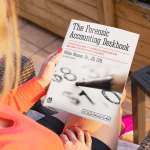In Divorces, Forensic Accountants Must Know These Rules Cold or Else

The Forensic Accounting Deskbook by Miles Mason, Sr. JD, CPA, published by the ABA Family Law Section
What are the rules of evidence? What is Rule 702 of the Federal Rules of Evidence?
For a much more detailed discussion, see The Forensic Accounting Deskbook: A Practical Guide to Financial Investigation and Analysis for Family Lawyers, Second Edition, authored by Miles Mason, Sr. and published by the ABA Family Law Section. This updated edition of one the ABA’s most popular resources explains the practice of forensic accounting and business valuation and how to apply it in family law cases. It provides a practice-focused introduction to the core financial concepts in divorce, such as asset identification, classification, and valuation, income determination, expenses, and more.
VIDEO TRANSCRIPT:
Tracy Coenen: Can you talk a little bit with us about the differing rules that expert witnesses fall under in divorce cases?
Miles Mason: Yes. There’s essentially three different areas. You’ve got rules of evidence, rules of civil procedure, and discovery. Those are the three big areas. Let’s start out with rules of evidence. That’s a separate set of rules. We’ll talk about federal rules of evidence here that apply in federal court, even though most family law matters are in state court. The reason is most state rules of evidence are based primarily upon the federal rules of evidence. There’s always some difference, so the forensic accountant needs to know the state rules of evidence. The good news is there’s not that many rules you have to know as a forensic accountant or a CPA testifying.
The main one that you need to have a basic working knowledge of is hearsay. It’s an out-of-court statement made by somebody else offered to prove the truth of the matter asserted, which is a mouthful. Essentially, every document that a forensic accountant is going to look at is hearsay, because it contains out-of-court statements made by somebody who’s not there. The great thing is expert witnesses can rely on hearsay. In order to form an opinion, a forensic accountant can look at hearsay, review it, and form an opinion. Forensic accountants need to have a working knowledge into how are documents admitted. That can be a discussion you’d have with the attorney on the case at the time. And of course, forensic accountants need to know how they’re admitted as an expert going through the process and direct examination. The lawyer will walk the forensic accountant through that process as well.
Discovery, as far as some of the working knowledge of the terms, interrogatories, which are set of questions asked under oath, or must be answered under oath, and request for production of documents, subpeonas, how all that works, it’s good for a forensic accountant to have a basic working knowledge as well as how the report treated. Some states require that a report be shared with the other side in advance of trial. Some states don’t talk about reports at all. Many states view reports as hearsay and inadmissible anyway. Also how does the testimony come about? What are the ins and outs of some of the rules regarding testimony? There also may be local rules to be aware of.
Tracy Coenen: Why is it so important that the expert be familiar with these rules of evidence?
Miles Mason: It makes the difference between being a good expert witness and a great expert witness. Having that working knowledge makes the expert witness more dangerous. The more you know, the better you’re going to be in the courtroom. When we’re talking about this, what it’s going to be, there’s going to be a challenge from the opposing counsel, the cross-examination. It may be a technical question involved regarding one of the rules that applies. If the forensic accountant has working knowledge of that, then may know where the lawyers going, beat him to it, or avoid a problem.
Tracy Coenen: We’ve mentioned the federal rules of evidence, but divorce cases are heard in state court. So, if we’re in state court, why do we care at all about the federal rules of evidence?
Miles Mason: Because many of the state rules of evidence are based on the federal rules of evidence, and sometimes it’s helpful to understand the differences between the two. Even though we’re talking about divorce, forensic accounting today, most forensic accountants will, if they’re going to practice long enough, find themselves in federal court.
Thank you to Tracy Coenen, CPA, CFF for inviting me to join her in this video series. Tracy is a nationally recognized forensic accountant practicing in Milwaukee and Chicago.









